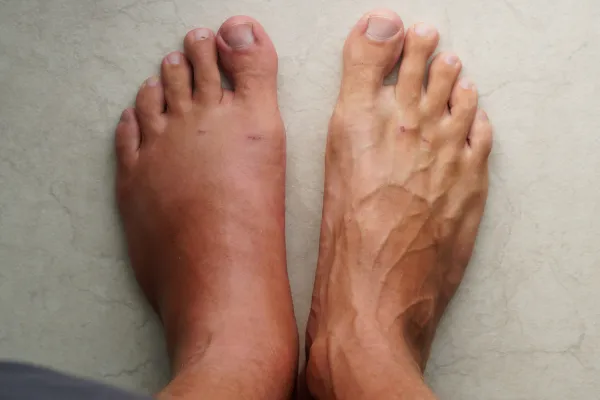
Why You Shouldn't Ignore Persistent Foot Swelling
“It’s Just Swelling… Right?” Not Always.
Have you noticed your shoes feeling tight at the end of the day? Maybe your ankles or feet look puffier than usual — and it's been going on for weeks.
A bit of swelling after a long day or a tough workout can be normal. But persistent foot or ankle swelling could be a sign of something more serious.
At Peak Podiatry, we often see people who’ve put up with swelling for far too long. Sometimes it’s nothing urgent — but other times, it’s a signal that your body is struggling with circulation, fluid buildup, or even organ function.
Let’s break it down.
What Causes Persistent Foot Swelling?
There are a few major reasons why your feet might stay swollen. Some are simple. Others need medical attention.
1. Venous Insufficiency
Your veins are meant to push blood back up to your heart. But if those veins aren’t working properly — especially in the legs — fluid can pool in the lower limbs.
Signs include:
Swelling that’s worse by evening
Tired, heavy legs
Skin that feels tight or looks shiny
Small varicose veins or changes in skin colour
It’s common as we age, especially if you stand or sit for long periods. But it’s not something to ignore.
2. Lymphoedema
Your body has a lymphatic system that moves fluid and fights infection. If it gets blocked or damaged, fluid can build up — leading to firm, chronic swelling.
Signs of lymphoedema:
Persistent swelling that doesn’t go away overnight
Thick, heavy-feeling skin
Dimpled or pitted skin texture
Risk of recurring skin infections (like cellulitis)
It often affects one foot more than the other and can happen after surgery, cancer treatment, or without a clear cause.
3. Heart, Kidney, or Liver Conditions
Your organs help balance fluids in the body. If something’s off — like heart failure, kidney problems, or liver disease — swelling may show up in the feet first.
That’s because gravity pulls extra fluid downward. If you also feel breathless, tired, or are gaining weight quickly, it’s time to see your GP.
Why See a Podiatrist at a Foot Clinic in Galway?
You might be wondering, “Isn’t this something for a doctor or hospital?” Yes — but your feet often show the first signs of trouble.
At Peak Podiatry’s foot clinic in Galway, we look at more than just skin and nails. We’re trained to spot early warning signs of circulation, fluid, and nerve issues — and we know when to act fast.
Here’s how we can help:
1. Foot and Ankle Assessment
We’ll check for swelling, skin changes, warmth, and circulation using special tools.
2. Check Your Foot Pulses
We assess blood flow using Doppler ultrasound to see if there’s a circulatory problem.
3. Monitor for Infection or Skin Breakdown
Chronic swelling puts skin at risk. We make sure there are no early signs of ulcers, blisters, or infection.
4. Refer If Needed
If we suspect a deeper issue (like heart or kidney problems), we’ll refer you quickly to your GP or specialist.
What You Can Do at Home
While you’re waiting for an appointment, here are a few simple things that might help:
Elevate your feet when resting
Wear compression socks (if advised)
Stay active — even short walks help blood flow
Avoid standing or sitting too long
Limit salt in your diet to reduce water retention
Check your skin daily for any new changes
But remember — these are only helpful if the cause is minor. If your swelling is new, worsening, or combined with other symptoms, don’t wait it out.
Your Feet Deserve a Closer Look
Swelling that sticks around isn’t just a cosmetic issue. It could be your body’s way of telling you something needs attention.
If you’ve had persistent foot or ankle swelling, even if it seems mild, come see us at Peak Podiatry — your trusted foot clinic in Galway. We’ll help figure out what’s going on and point you in the right direction for treatment.
Ready to stop guessing? Book your foot assessment today at Peak Podiatry Galway. Let’s get to the bottom of your swelling — and keep you on your feet.
Ask Robert And His Team
Fill in the form to request a Call From Our Team
Fill in the form to request a Call From Our Team
One of our team will call you for FREE and answer any questions or concerns you may have about your Foot Pain.
One of our team will call you for FREE and answer any questions or concerns you may have about your Foot Pain.
© Copyright 2022. Peak Podiatry All rights reserved.





